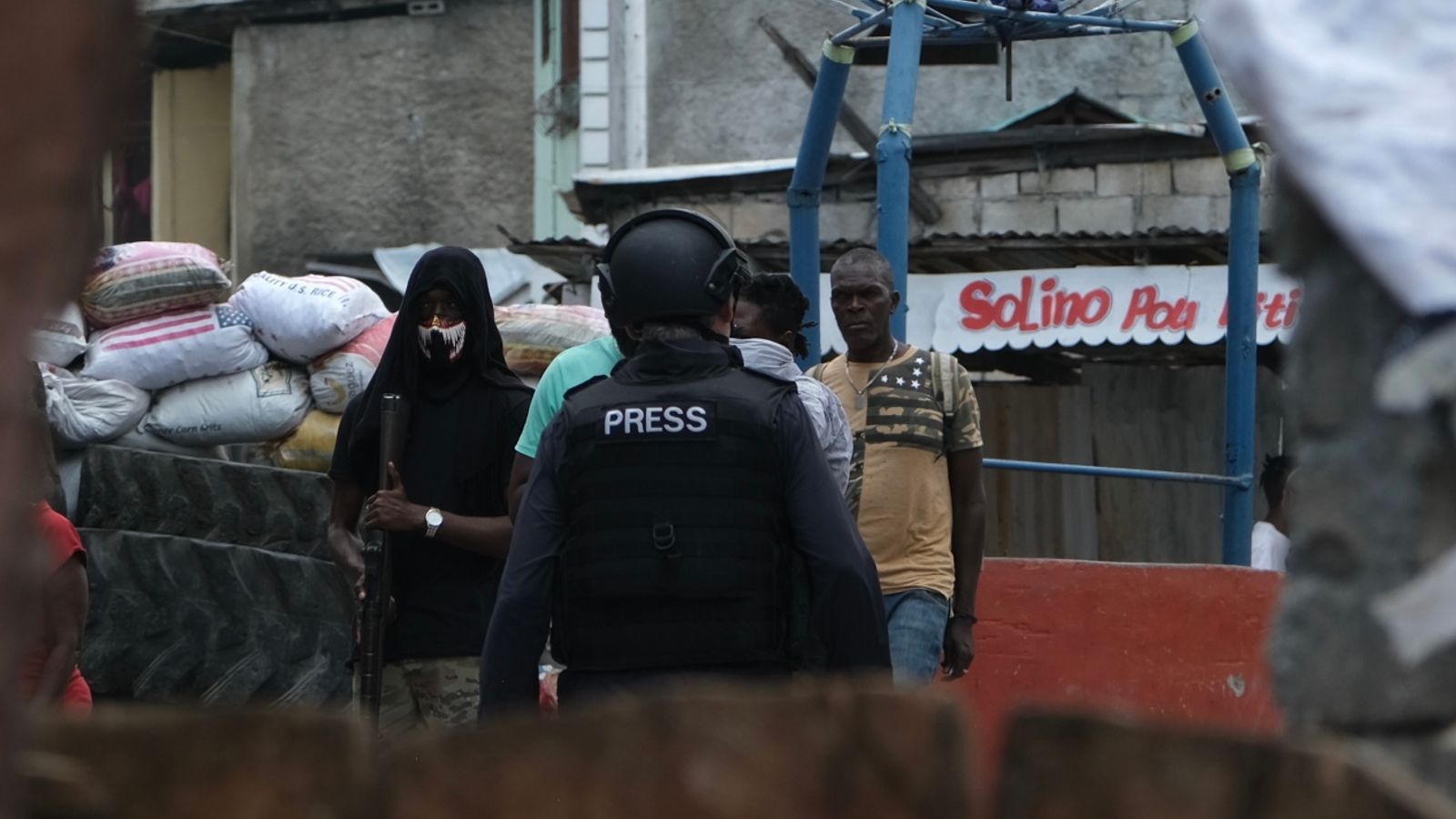In Haiti’s capital, people have become used to violence and step around the dead. Nobody knows the reason for many murders. Locals fighting back are willing to “give their heart and soul for the freedom of the neighbourhood, and the freedom of this country”, says one man.
By Stuart Ramsay, Chief correspondent @ramsaysky
For us, every day in Port-au-Prince starts with a situation report on the latest outbreak of fighting in this beleaguered capital city.
It’s often near the presidential palace and government buildings in the downtown district, but in truth it can be anywhere – nowhere feels safe.
Every day as we drive around town we see bodies on the road. Cars, motorcycles and buses don’t stop, and people step around the dead.
Sometimes the bodies are covered with sheets, sometimes they are set on fire, and sometimes they just lie there in the blistering heat.
Families often don’t retrieve their loved ones because they don’t have the money to pay for a burial.
Their hope is that passing NGOs or government workers will take the bodies away.
Bodies left on the streets
Nobody knows the reasons for mystery murders
On one street a man has been shot, with a tyre placed in front of his body so vehicles don’t drive over him.
On another street, a man and a woman have been killed. They were riding a motorcycle when they were shot. The woman was still holding a bag of rice in her hand.
And on a street just up the road from that scene, I watched a mother walking with her young daughter. They passed a charred and still-burning body of a woman killed overnight.
They didn’t pay much attention to the scene that would shock anybody anywhere else. But not in Port-au-Prince.
Nobody knows why these murders happened.
A city where quiet means danger
Society is inured to the horror of life here, where the bodies are just the grisly manifestation of the shooting one can hear echoing around the city every day.
Driving in Port-au-Prince is sometimes challenging. Motorcycles, tuk-tuks, cars and lorries jostle for position on decrepit, narrow roads.
When the roads go quiet, you know instinctively you are in a dangerous place.
The main road to the international airport is dangerous and tense – few cars travel on it anymore.
The airport is guarded by the military. It’s the only place they are visible. We drive up to the main entrance past soldiers and their vehicles.
The airport is completely closed. There is not a plane in sight, the control tower is shut, and the airport zone in general is deadly quiet.
The overwhelming sense you get here is of a capital city not only cut off from the rest of the country, but cut off from the rest of the world.
It’s a siege from within if you like, and everyone is a prisoner.
Vigilantes fighting back night and day
Neighbourhood after neighbourhood is barricaded off with vehicles, sandbags, concrete blocks, old fridges, barbed wire, tree trunks… they use whatever they can find.
Some of the areas are gang territories and others are communities trying to protect themselves.
Through the barricades, we were given permission to enter a place called Solino, a community of 10,000 people that has been attacked by two separate gangs for over a year now. They’re trying to take it over.
At least 80% of Port-au-Prince has fallen to the gangs – but it’s not happening in this neighbourhood because Solino is protected by armed vigilantes and off-duty police officers who live here and fight them together.
We’re told to wear our body armour and helmets because the fighting can start at any moment.
An off-duty police officer guides us on foot towards another barricade that protects neighbourhoods. This barricade is piled high with sandbags. On the other side is the territory of two different gangs.
It is that close.
The homes and the streets on the frontline are deserted, and although the homes burnt out by the gangs have been taken back, they’re uninhabitable – it’s simply too dangerous.
Regular attacks kill men on both sides, but this vigilante group is holding on in this turf war.
They believe they will win – or rather, they hope they will.
Read more:
The families trapped in Haiti’s violent capital with nowhere to go
None of the men I speak to want to show their faces or give their names, though they are happy to talk.
Wearing a black balaclava to cover up, one of the civilians who has joined the group to protect the community told me they’re doing everything they can to protect their community.
“This may look like a ghetto to you, but it’s not. There are engineers and doctors who live here, it’s a nice area,” he said.
He feels passionately that they can and must hold the gangs back, not least because Solino is considered by the gangs to be a gateway to the areas of Port-au-Prince they haven’t yet taken.
“It’s us citizens along with the police officers who are controlling this area, without them we wouldn’t have what you see here today in Solino, and we continue to fight tooth and nail, night and day, to protect the area,” he said.
“We have families who have left the area, but those who remain give their heart and soul for the freedom of the neighbourhood, and the freedom of this country.”

Emily Foster is a globe-trotting journalist based in the UK. Her articles offer readers a global perspective on international events, exploring complex geopolitical issues and providing a nuanced view of the world’s most pressing challenges.








